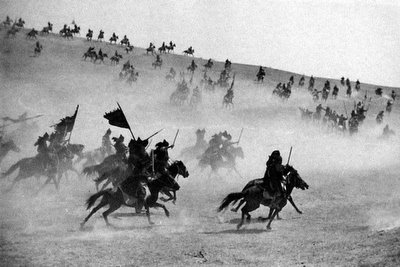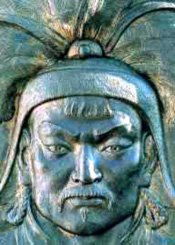Those Old Fashioned Values

Recently read one of the most famous quotes attributed to Genghis Khan. Found it an interesting book called The Empire of Debt (I plan on writing a review on this book sometime soon). I think the anecdote speaks for itself:
One of the Khan's generals commented that the sweetest pleasure in life was practising the art of falconry. This was Genghis' reply:
No, you are mistaken. Man's greatest good fortune is to chase and defeat his enemy, seize his total possessions, leave his married women weeping and wailing, ride his gelding and use the bodies of his women as a nightshirt and support.

Ahh, the good old days, when real men were maurading murdering rapists. Fortunately, people have changed. Or have they really? I think it's more accurate to say that the basic human instincts are the same, but are channeled in more productive directions by 'civilized' rules of engagement. In the long run it's better for everyone involved to slay their opponents in the market place, or in a debate, than to actually fire an arrow into to their eyesocket. I have to admit though, there are times when the latter would be far more rewarding in the short-term ;-)

For those of you not familiar with Genghis' wonderful record here's my very brief summary. The 12th and 13th century are often called the "Age of the Mongols". The Mongol armies during that time were extremely well organized, using the classic central Asian steppe warrior tactics lethally combining superb horsemanship with deadly accurate archery skills. Genghis was clever enough to use blitz and withdraw tactics in the field and was able to learn how to conduct seige warfare mainly during his conquest of Chinese cities. Genghis conquered and laid waste to Northern China, Central Asia, and 'Persia'. He had a habit of completely annihilating entire cities usually when they offered any sort of resistance to his armies. But on occasion he slaughtered entire cities even if they didn't resist because 'he had no use for them' (particularly in areas of modern-day western Afghanistan, areas which never fully recovered from the Mongol depredations). His offspring continued his legacy laying waste to much of the Middle East and Eastern Europe, and his blood could be found running through the veins of later mass-murdering conquerors such as Tamerlane. His conquests laid the foundations of the largest land empire in the history of the world. The death toll (by battle, massacre, and famine) of the Mongol wars of conquest has been placed as high as 40-60 million, up to one fifth of the world's population at the time.
And what's the reward for being one of mankind's greatest butchers. Here's a passage from the Wikipedia entry on Genghis:
Historians and scientists are looking into positive aspects of Genghis Khan's conquests. Genghis Khan, successor Khans and Mongols are credited to bringing the Silk Route under one cohesive political environment... Genghis Khan is ranked #29 on Michael H. Hart's list of the most influential people in history. An article that appeared in the Washington Post on December 31, 1995 selected Genghis Khan as "Man of the Millenium".
Splendid idea, since there's no longer any full-blooded visceral record of his crimes (i.e. since there was no one with a camera to capture what an entire city of people being slaughtered by hand looks like), let's glorify him as a great empire builder. The ivory-tower dwelling sophists that come up with these types of arguments are the same sort who argue that war can be a good thing when it stimulates a moribund economy, or the black death was ultimately for the best since it helped to bring on the renaissance. Don't believe a word of this Panglossian nonsense. If someone dropped a nuke on London I'm sure you could find some positive consequences after the fact. Word of advice for future rampaging conquerors, make sure you win. The old adage of the winner writing history is true. But probably a more accurate way of putting it, any winner with any sort of lasting constructive legacy is always viewed kindly by history- no matter how much they destroyed to establish their dominance. After all, the ruler usually gets a good chunk of the credit for anything positive happening during their reign.
But what was the biggest prize was for good old Genghis, this great sower of human misery:
The authors of a paper published in 2003 identified a Y-chromosomal lineage present in about 8% of the men (or about 0.5% of the men in the world if extrapolated) in a large region of Asia stretching from the Pacific Ocean to the Caspian Sea...The authors propose that the lineage is carried by likely male-line descendents of Genghis Khan, and that it has spread not through any biological advantage, but through social selection resulting from their behavior.
The quote from Genghis doesn't just reveal the mindset of one man, but it reveals some of the 'values' most men living in a conquering warrior society would have held. It isn't just pleasurable, but somehow a good thing for the most savage and strong to exterminate (or at least dominate) the peaceful and weak. It's certainly hackneyed, but it's undeniable that much of human history is a litany of horrors and outrages. It's an important reminder to all the gloomy cynics out there: for the most part, the world used to be a much more wretched place for human beings than it is now. Despite all the talk of inhumanity and decadence of our modern age, we're largely shielded from the ugliest side of the life. We only catch glimpses of what real human depravity is vicariously. The vast majority of us only see the tip of the iceberg in our day to day interactions with others.
A lot of you are probably thinking to yourself: Why is he bringing up all this ancient history?? First of all, I think it shows that those who look to the past for a some golden-age better than the one we live in are deluded. I'm definitely not saying that history can't teach us anything, on the contrary it shows how humans behave in a variety of circumstances- it reveals a great deal about human nature. The genetic legacy of Genghis Khan is as clear a demonstration as any that our human heritage is largely a product of the most ruthless and savage triumphing over those with more gentle temperaments. In other words, much of human nature has been inherited from the most savage competitors in life and death zero-sum contests. Of course, some of human nature is also a product of those who successfully learned to cooperate with each other as well. We do derive much of our inheritance from those likeable backslapping ancestors who had amenable and ingratiating characteristics. The inner savage can be noble and generous but also hideously cruel as well. In my view, it is clear that much of human morality is about promoting 'the greater good' over the natural selfish, base, and destructive human instincts that lie in all of us. Natural impulses are not necessarily good. This idea was eloquently presented in Robert Wright's The Moral Animal
Believe it or not, I'm an optimist. The constructive side of humanity has been winning over time, the progress of civilization is a testament to that (Actually, Robert Wright wrote another great book exactly on that topic called NonZero
For a humourous take on good old fashioned male warrior values, check out Gary Brecher's article (one those wretched souls over at the Exile), on how an old fashioned Dane might have dealt with the whole Muhammad cartoon kerfuffle.






1 Comments:
I have been following a site now for almost 2 years and I have found it to be both reliable and profitable. They post daily and their stock trades have been beating
the indexes easily.
Take a look at Wallstreetwinnersonline.com
RickJ
Post a Comment
<< Home